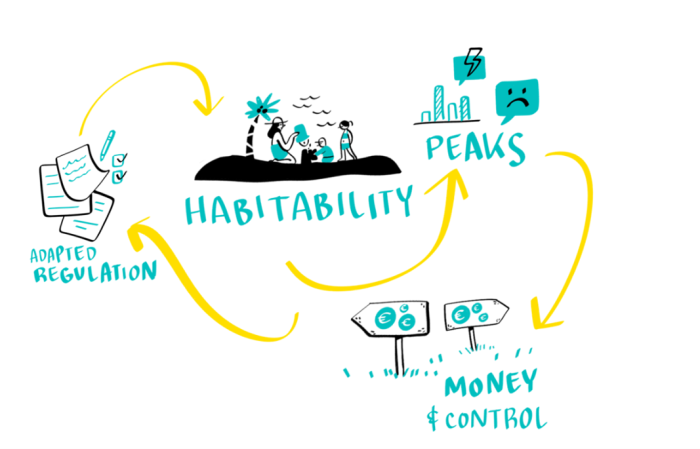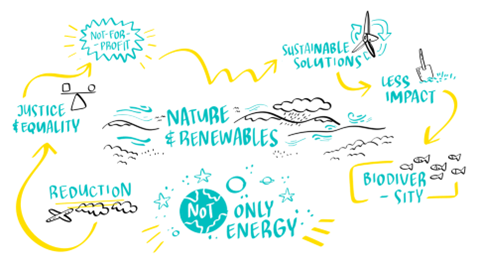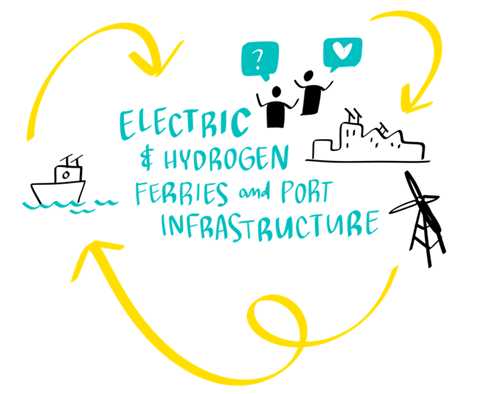
Watch the recording of the summary of all sessions on day two (08 June) of the Clean energy for EU islands forum.
Workshop - Habitability on small islands
Participants: Pia Prost - Föss (Finland), Gaspare Inglese - Pantelleria (Italy), Geraldine Ghóill – Inish Mor (Ireland), Moderator: Alexis Chatzimpiros - Samsø Energy Academy (Denmark)
- Difficulty in providing facilities for islands due to the extreme ratio of permanent inhabitants to peak inhabitants (tourists, second homes) and imbalanced payments for public facilities and services.
- The importance of money and local control in driving local decarbonization projects on islands and the need for local engagement and support.
- The need for complementary solutions on islands considering factors such as seasonality, unit size, and serviceability, which often require adapted regulations.
- Emphasizing the need to start projects and address issues along the way as part of the solution for islands.
Workshop - Island benefits from offshore wind development
Participants: Stefano Barberis - Blue energy revolution (Italy), Terje Talv - Estonian Wind Power Association (Estonia), Riccardo Novo - Politecnico di Torino (Italy), Moderator: Maja Jurisic - Island Movement (Croatia)
- Offshore and floating offshore wind farms are important for clean and secure energy.
- Floating wind farms offer flexibility, lower environmental impact, and can be installed far from the coastline, however, the cost of cabling and grid infrastructure can be significant.
- Hydrogen can be coupled with offshore power plants for decarbonizing sea connections and island energy generation, utilising existing islands for hydrogen-based energy generation is more cost-effective than building artificial hydrogen islands.
- Islands can host novel technologies or connect to nearby large wind farms, connecting to large wind farms can be a compensation measure established by Member States (Estonia showcases best practices in this field).

Workshop - Decentralised heating & cooling
Participants: Pauline Lucas - Euroheat and Power (Belgium), Moderator: Danai Bertzouani – DNV (The Netherlands)
- Decentralized heating and cooling solutions offer significant benefits, including reduced energy consumption and cost savings.
- Deep sea water air conditioning systems, like the one implemented in Tahiti Hospital, can effectively lower electricity bills and provide cooling while utilizing renewable resources.
- The use of renewable energy sources, such as wind, solar, and biomass, in district heating systems, as demonstrated by Bornholm District Heating in Denmark, contributes to carbon neutrality and sustainable heat production.
- Hybrid heat storage solutions offer a promising approach to balancing energy demand and supply, improving the efficiency and reliability of heating systems.
- Heat networks, power-to-heat conversion, and waste-to-heat technologies play crucial roles in achieving sustainable and efficient heating and cooling systems.
- Ground and air source heat pumps are valuable tools in decentralized heating and cooling, providing renewable and efficient heating solutions.
- Engaging communities and ensuring their participation and benefits are vital for successful decentralized heating and cooling projects.
Workshop - Aligning nature and renewable energy development
Participants: Gaspare Ingles - National Park Isle of Pantelleria (Italy), Merit Kindsigo - Saaremaa biosphere initiative (Estonia), Aida Garcia – Eurelectric (Belgium), Claudio Moscolini – Politechnico di Torino (Italy), Moderator: Pau de Vilchez Moragues – UIB (Spain)
- Addressing the compatibility between energy transition and environmental protection.
- Importance of design and citizen participation in renewable energy.
- Supporting underground energy cables and integrating social and environmental aspects.
- Long-term well-being, values, justice, and democracy in sustainability.
- Role of biosphere programs in promoting awareness, education, and innovation.
- Targets and policies for renewable energy deployment.
- Enhancing biodiversity and combating climate change through renewables.
- Balancing human actions and integrating renewable energy with the landscape.

Workshop - Funding and financing for Renewable Energy islands: What to expect?
Participants: Amandine Gal – Econoler (Switzerland), Jorge Rodrigues de Almeida – RdA (Portugal), Alessandra Montanelli – NESOI
- Funding for island energy projects is available through public funding and the market, but accessing it requires high-quality feasibility studies, cash flow forecasts, and comprehensive risk assessments.
- Energy Service Companies (ESCOs) are an overlooked entry point for funding, as their long-term energy efficiency measures ensure self-sustainability.
- Capacity building and public awareness sessions should be included as requirements in funding packages or public tenders to gain support from local communities and stakeholders.
- Planning for energy transition should encompass holistic and horizontal dimensions to ensure successful buy-in from stakeholders.
- Smaller island communities have a strong interest in decarbonizing their economies, but their projects are often too small to attract market investment, smaller investment options are needed.
Watch the recording.

Workshop - Electric and hydrogen ferries and port infrastructure
Participants: Gabriele von Hundelshausen - Isla de Arosa (Spain), Petros Markopoulos – Astypalea (Greece), Sulev Alajõe – Saaremaa (Estonia), Moderator: Stefano Barberis - Blue energy revolution (Italy)
Smart marinas, port infrastructure upgrades, electrical ferries in Denmark, hydrogen efforts in general, there seem to be a lot of solutions, green solutions need to be integrated and decisions are influenced by distances.

